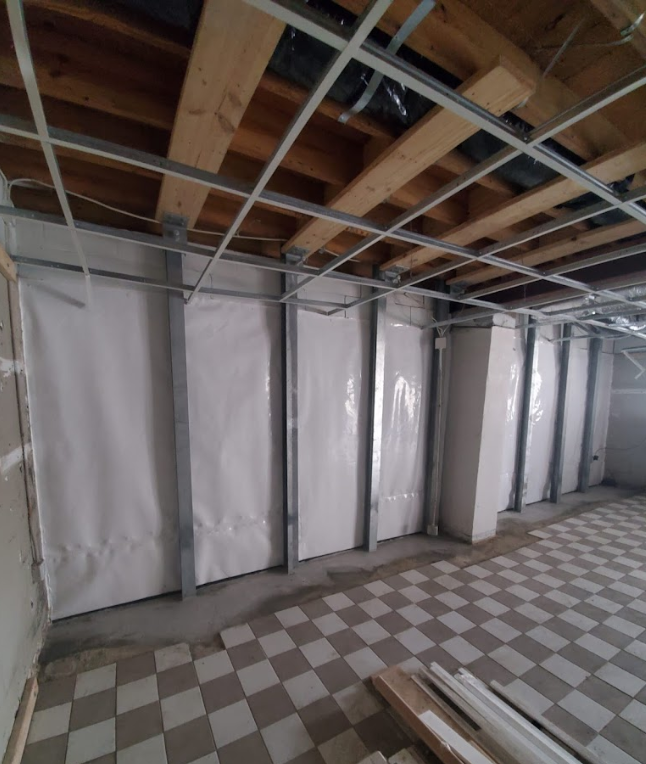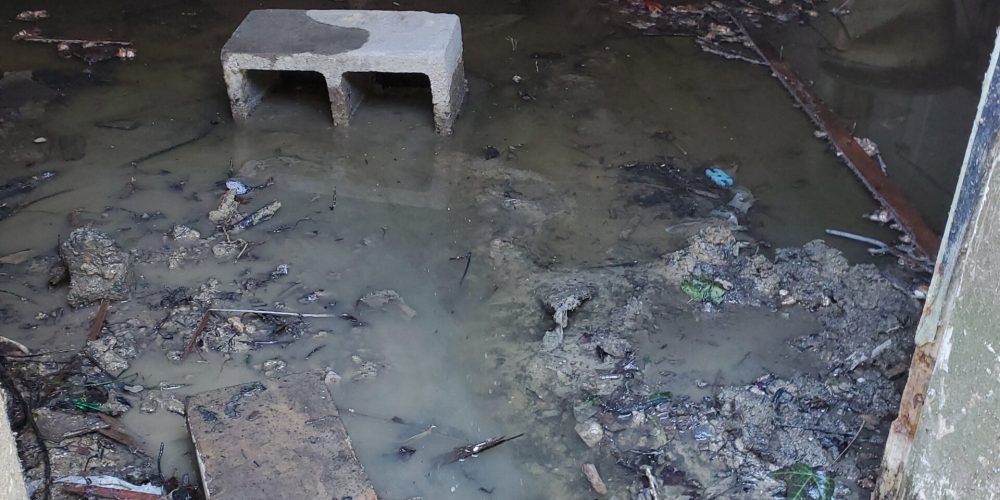Basement waterproofing is a smart investment. It safeguards your home’s foundation, prevents mold, and maintains property value. Interior sealants and exterior coatings are common methods. Material quality and labor impact costs. Top-notch materials ensure long-lasting protection. Labor rates vary by complexity and location. Signs like musty odors indicate water issues. DIY kits are suitable for minor leaks, but professionals handle intricate systems. Guard against expensive repairs by waterproofing. Enhance property value and family health. Explore more about the benefits and savings.
Key Takeaways
- Basement waterproofing prevents costly repairs and structural damage.
- It increases property value and creates a healthier living environment.
- Professional waterproofing ensures long-term protection and peace of mind.
- DIY options exist for minor leaks, but pros handle complex systems.
- Investing in waterproofing safeguards your family’s well-being and health.

Importance of Basement Waterproofing
Basement waterproofing plays an important role in protecting your home’s foundation from water damage and ensuring a dry, safe living environment. Water intrusion into the basement can lead to various issues, such as mold growth, structural damage, and decreased indoor air quality. By investing in basement waterproofing, you’re taking proactive steps to safeguard your home and create a comfortable living space for you and your family.
One vital aspect of basement waterproofing is the prevention of hydrostatic pressure. Hydrostatic pressure occurs when water accumulates in the soil surrounding your foundation, exerting force against the basement walls. Over time, this pressure can cause cracks, leaks, and even structural failure. A properly waterproofed basement with effective drainage systems can mitigate hydrostatic pressure, reducing the risk of foundation damage.
Additionally, basement waterproofing helps to maintain the value of your property. A dry basement free from water damage is a significant selling point for potential buyers. It demonstrates that the home has been well-maintained and is less susceptible to issues related to water intrusion. By investing in basement waterproofing now, you aren’t only protecting your current living environment but also ensuring the long-term value of your home.
Common Waterproofing Methods
To effectively waterproof a basement and protect against water damage, various methods are commonly employed. One of the most popular techniques is interior sealants. These sealants are applied to the interior walls and floors of the basement to create a barrier against moisture. They’re relatively easy to apply and can be effective in preventing water intrusion.
Another common method is exterior waterproofing. This involves excavating around the foundation of the house to apply a waterproof coating or membrane to the exterior walls. By doing this, water is prevented from seeping into the basement from the outside.
French drains are also frequently used in basement waterproofing. These drains are installed beneath the basement floor to collect and redirect water away from the foundation. They can help alleviate hydrostatic pressure and prevent water from pooling around the basement.
Sump pumps are essential components of many waterproofing systems. These pumps are installed in a pit on the basement floor and are designed to pump out any water that accumulates in the area. They’re particularly useful in areas prone to flooding or high water tables.
Factors Affecting Waterproofing Costs
When contemplating waterproofing costs, factors such as material expenses impact the overall costs considerably.
Moreover, labor costs can vary depending on the complexity of the project and the expertise required.
The size of the area to be waterproofed is also a vital determinant in estimating the overall investment needed for effective basement waterproofing.
Material Costs Impact
Considering the various factors affecting waterproofing costs, the impact of material expenses stands out as a significant component to evaluate closely. The type and quality of materials used in basement waterproofing can greatly influence the overall cost of the project. High-quality materials tend to be more expensive but offer better long-term protection against water intrusion.
On the other hand, opting for lower-cost materials may initially reduce expenses but could result in the need for frequent repairs or replacements, ultimately costing more in the long run. It’s essential to strike a balance between cost and quality when selecting materials for basement waterproofing to ensure effective and lasting protection for your home.
Labor Expenses Vary
Labor expenses in basement waterproofing projects vary considerably based on several key factors that directly impact the overall cost.
The complexity of the job plays a significant role in determining labor costs; intricate waterproofing systems or extensive repairs may require more skilled labor and, therefore, increase expenses.
Additionally, geographical location can influence labor expenses, as areas with higher costs of living tend to have higher labor rates.
Moreover, the time of year can impact labor expenses, with peak seasons potentially leading to higher costs due to increased demand for waterproofing services.
Size of Area
The size of the area requiring waterproofing is a vital factor that greatly influences the overall costs of the project. Larger areas will naturally require more materials for waterproofing, as well as increased labor hours for installation. The extent of the area to be waterproofed directly impacts the amount of sealant, drainage systems, and insulation needed.
Additionally, larger spaces may present more complex challenges, such as multiple walls or corners, which can further escalate costs. When evaluating the size of the area, it’s essential to take into account not only the square footage but also the configuration of the space.
Understanding the size of the area accurately is crucial for determining the scope of work required and ensuring a thorough waterproofing solution that adequately protects your basement.
Cost-Benefit Analysis of Waterproofing
When evaluating the cost-benefit analysis of waterproofing a basement, it’s essential to take into account the potential long-term savings versus the initial investment. Waterproofing your basement can provide significant cost savings over time by preventing water damage, mold growth, and structural issues. The initial investment in waterproofing may seem significant, but it’s important to contemplate the potential expenses that could arise from water damage if left untreated.
Waterproofing your basement not only protects your property but also adds value to your home. A dry and secure basement enhances the overall living space and increases the resale value of your property. By investing in waterproofing now, you’re safeguarding your investment and ensuring that your home remains structurally sound for years to come.
Moreover, the peace of mind that comes with a waterproofed basement is invaluable. Knowing that your basement is protected from water intrusion allows you to utilize the space more effectively without the worry of potential water damage. This additional living or storage space can improve your quality of life and provide a sense of security.

Signs You Need Waterproofing
If you notice dampness or water seepage on your basement walls, it could be a sign that waterproofing is necessary. Addressing these issues early can prevent more extensive damage to your home’s foundation.
Investing in waterproofing now can save you money in the long run by avoiding costly repairs.
Common Warning Signs
Experiencing dampness or musty odors in your basement could indicate the need for waterproofing to prevent potential water damage. These warning signs often point to underlying issues such as water seepage through cracks in the foundation, poor drainage, or high humidity levels. Look out for water stains on walls or floors, peeling paint, or visible mold growth as these can signify a moisture problem that requires immediate attention.
Additionally, if you notice rust on metal surfaces, warped wood, or a white, powdery substance on walls, these could all be red flags signaling water infiltration. Addressing these common warning signs promptly through waterproofing measures can help protect your basement from extensive damage and maintain a dry, healthy living environment.
Importance of Prevention
Detecting signs of water infiltration in your basement is essential to prevent potential damage and maintain a dry, healthy living space.
Look for damp or musty odors, mold growth, water stains on walls, peeling paint or wallpaper, and efflorescence on concrete walls. Cracks in the walls or floors, pooling water, rust on metal surfaces, and a high humidity level are also indicators of water issues.
Addressing these signs promptly can help you avoid more extensive damage like foundation cracks, structural issues, and health hazards from mold.
Cost-Effective Long-Term Solution
To identify the need for waterproofing in your basement, closely observe visible signs of water infiltration to safeguard against potential damage and maintain a dry, healthy living environment. Look for damp spots on walls or floors, musty odors, peeling paint or wallpaper, or mold growth. These indicators suggest water is finding a way into your basement.
Addressing these signs promptly can prevent more extensive damage to your home’s foundation and belongings. Waterproofing your basement is a cost-effective long-term solution that can save you money in the future by avoiding expensive repairs due to water damage.
Investing in waterproofing now won’t only protect your property but also provide peace of mind, knowing your basement is secure from water intrusion.
DIY Vs. Professional Waterproofing
When deciding between tackling basement waterproofing as a DIY project or hiring a professional, it’s essential to contemplate various factors to make an informed choice. DIY waterproofing kits are readily available at hardware stores and online, offering an attractive option for those looking to save money. These kits typically include sealants, membranes, and instructions for application. However, it’s important to take into account the complexity of the task. While DIY kits may work for minor leaks or dampness, more severe issues, such as foundation cracks or extensive water damage, may require professional expertise.
Professional waterproofing contractors bring experience, specialized tools, and industry knowledge to the table. They can conduct a thorough assessment of your basement, identify the root cause of water infiltration, and recommend tailored solutions. Professionals are equipped to handle complex waterproofing systems, such as interior and exterior drainage systems, sump pumps, and French drains, ensuring long-lasting protection for your basement.
Additionally, hiring a professional for basement waterproofing can provide peace of mind. Most contractors offer warranties on their work, assuring you that the job is done right. While DIY may seem cost-effective initially, a botched waterproofing job can lead to costly repairs down the road. Ultimately, the decision between DIY and professional waterproofing should be based on the severity of the issue, your comfort level with DIY projects, and your long-term investment in protecting your home.
Long-Term Savings and Benefits
Considering the long-term savings and benefits of basement waterproofing is essential for making a sound investment in protecting your home from potential water damage. Waterproofing your basement can provide significant cost savings over time by preventing costly repairs due to water damage. By addressing the root cause of moisture intrusion, you can avoid structural issues, mold growth, and damage to your belongings, which can be expensive to remediate.
Moreover, basement waterproofing can increase the overall value of your home. A dry, functional basement adds usable space to your property, potentially expanding your living area and enhancing the resale value of your home. This improvement can be particularly attractive to future buyers who are looking for a home with a well-maintained basement that’s free from water-related issues.
In addition to financial savings and property value, basement waterproofing contributes to a healthier living environment. By reducing moisture levels, you can minimize the risk of mold and mildew growth, which can have adverse effects on indoor air quality and respiratory health. Investing in basement waterproofing not only protects your home but also safeguards the well-being of your family by creating a drier and healthier living space.
Wrap-Up
When considering the cost of basement waterproofing, remember the saying, ‘An ounce of prevention is worth a pound of cure.’
Investing in basement waterproofing may seem like a significant expense upfront, but the long-term savings and benefits far outweigh the initial cost.
By addressing potential water damage early on, you can avoid costly repairs and protect the structural integrity of your home.
So, don’t hesitate to invest in basement waterproofing for peace of mind and financial security.
Wishing you a joyful construction experience! Also, explore our additional sites: Glen Allen, Henrico, and Hopewell.
